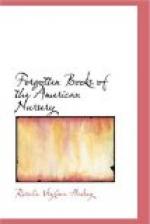Perpetual action was the key to the success of Miss Edgeworth’s writings. If to us her fictitious children seem like puppets whose strings are too obviously jerked, the monotonous moral cloaked in the variety of incident was liked by her own generation,
Miss Edgeworth not only pleased the children, but received the applause of their parents and friends. Sir Walter Scott, the prince of story-tellers, found much to admire in her tales, and wrote of “Simple Susan:” “When the boy brings back the lamb to the little girl, there is nothing for it but to put down the book and cry.” Susan was the pattern child in the tale, “clean as well as industrious,” while Barbara—a violent contrast—was conceited and lazy, and a lady who “could descend without shame from the height of insolent pride to the lowest measure of fawning familiarity.” Therefore it is small wonder that Sir Walter passed her by without mention.
However much we may value an English author’s admiration for Miss Edgeworth’s story-telling gifts, it is to America that we naturally turn to seek contemporary opinion. In educational circles there is no doubt that Miss Edgeworth won high praise. That her books were not always easy to procure, however, we know from a letter written from Washington by Mrs. Josiah Quincy, whose life as a child during the Revolution has already been described. When Mrs. Quincy was living in the capital city in eighteen hundred and ten, during her husband’s term as Congressman, she found it difficult to provide her family with books. She therefore wrote to Boston to a friend, requesting to have sent her Miss Edgeworth’s “Moral Tales,” “if the work can be obtained in one of the bookstores. If not,” she continued, “borrow one ... and I will replace it with a new copy. Cut the book out of its binding and enclose the pages in packets.... Be careful to send the entire text and title page.” The scarcity in Washington of books for young people Mrs. Quincy thought justified the hope that reprinting these tales would be profitable to a bookseller in whose efforts to introduce a better taste among the inhabitants she took a keen interest. But Mrs. Quincy need not have sent to Boston for them. Jacob Johnson in Philadelphia had issued most of the English author’s books by eighteen hundred and five, and New York publishers probably made good profit by printing them.




